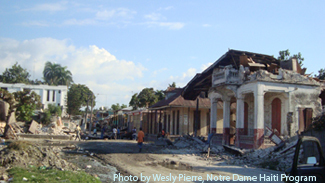
The nearly unimaginable catastrophe of Haiti confronts any person of faith with the reality and paradox of the Cross, but for the brothers, sisters and priests of the Congregation of Holy Cross, the confrontation has been particularly intimate during the last few days.
Since 1944, when Holy Cross missionaries first came to Cap Haitien, the congregation, the same religious order which founded the University of Notre Dame a century earlier, has established numerous educational, social and parochial ministries throughout Haiti. Holy Cross community is now organized there as the Province of Notre-Dame du Perpetual Secours with 49 professed members, including two Holy Cross bishops, 25 temporarily professed members, five novices and six postulants.
Immediately after the earthquake, and continuing in its aftermath, stories of pain, grief, resolve and faith have circulated among the Holy Cross communities internationally, all of them resonating with the reminder in their order’s constitutions that “there will be dying to do on our way to the Father.”
Holy Cross religious are a vital presence in this already beleaguered nation, 80 percent of whose population are members of the Catholic Church. And neither the Church nor the Holy Cross order was spared when the earth began to shudder. Returning to Notre Dame after having miraculously survived the collapse of the Montana Hotel in Port-au-Prince, Rev. Thomas Streit, C.S.C., founder of Notre Dame’s Haiti Program, describing the apocalyptic horror he had witnessed in the rubble of the city the fact that “the churches were all gone, all of them. Places that I had prayed in, places that mean so much to the nation’s people. That was their source of hope. And yet, people at night were praying and singing. They were holding hands as perhaps the only thing they could do without food or water. They turned to God.”
Recognizing Father Streit as a priest, one surviving woman bellowed at him accusingly as he wandered the ruins, “The church fell down on the people as they were praying!”
“She and many others were clearly angry,” he said, shrugging. “I can’t blame them.” In no mood for theodicy, he added, “But they were the exceptions. I came away with an experience I would not have wished for, but one that has shown me the strength of the human spirit, and that spirit so clearly sustained by our belief and our faith.”
Father Streit is unlikely to stay away from Haiti very long.
“I just can’t fathom what the next step is,” he said, “but I expect that all of us together will do what Haiti has done for so long, which is to lean on our faith, our families and our friends and move forward. There’s a Haitian expression, ‘pa za pa,’ step by step, little bit by little bit. One thing I would say about the people of Haiti is that they really depend on their faith.
“I would urge all the people who are planning relief efforts now not to forget this important element of nourishment for the Haitian psyche and spirit: Faith. We can provide immediate needs, medical needs and nutritional needs, but we’ve got to find ways to help people find that old support which has gotten them through 200 years of difficulty and that is their faith. I think both Holy Cross and the larger church have a very important role to play in that.”
Suffering and hope are similarly intertwined in the e-mails from Holy Cross communities in Haiti to their brothers and sisters worldwide. One, in French, from Rev. Michel Eugène, C.S.C., confirmed that a still unretrieved corpse buried among many others beneath the debris of the University Quisqueya was indeed that of “notre confrere” Emmanuel Jacques Guillaume, C.S.C., whose parents were being notified. Another, from Sister Maureen Fuelkell, C.S.C., reported the arrival of a Holy Cross priest from Port au Prince in Cap Haitien. “He said he could walk on the main street for blocks and blocks and look at the sea,” Sister Maureen wrote. “That is how flattened the city is.
“Thanks to everyone for your prayers and solidarity,” she continued. “We shed tears, we hurt, but know we are not alone. Many things will be changed forever, but life will go on because we know we are loved by a Divine Presence in our midst.”
As they correspond with, pray for and organize relief efforts for the victims of the disaster, the members of the Holy Cross community in this country express a striking appreciation of their kinship with those in Haiti. “Our constitutions tell us that ‘It remains only for us to find how even the cross can be borne as a gift,” said Rev. David Tyson, provincial superior of the Indiana Province of Holy Cross. “Haiti may end up teaching as that very thing. For now, I remember the charge of our constitutions that ‘we are men with hope to bring.’ I want to do that for my Haitian confreres.”